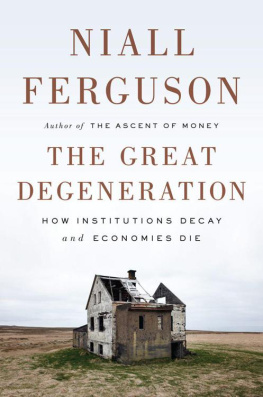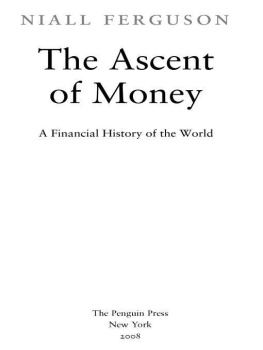Niall Ferguson - The Great Degeneration
Here you can read online Niall Ferguson - The Great Degeneration full text of the book (entire story) in english for free. Download pdf and epub, get meaning, cover and reviews about this ebook. publisher: Penguin Books, genre: Politics. Description of the work, (preface) as well as reviews are available. Best literature library LitArk.com created for fans of good reading and offers a wide selection of genres:
Romance novel
Science fiction
Adventure
Detective
Science
History
Home and family
Prose
Art
Politics
Computer
Non-fiction
Religion
Business
Children
Humor
Choose a favorite category and find really read worthwhile books. Enjoy immersion in the world of imagination, feel the emotions of the characters or learn something new for yourself, make an fascinating discovery.
- Book:The Great Degeneration
- Author:
- Publisher:Penguin Books
- Genre:
- Rating:5 / 5
- Favourites:Add to favourites
- Your mark:
- 100
- 1
- 2
- 3
- 4
- 5
The Great Degeneration: summary, description and annotation
We offer to read an annotation, description, summary or preface (depends on what the author of the book "The Great Degeneration" wrote himself). If you haven't found the necessary information about the book — write in the comments, we will try to find it.
The Great Degeneration — read online for free the complete book (whole text) full work
Below is the text of the book, divided by pages. System saving the place of the last page read, allows you to conveniently read the book "The Great Degeneration" online for free, without having to search again every time where you left off. Put a bookmark, and you can go to the page where you finished reading at any time.
Font size:
Interval:
Bookmark:

THE PENGUIN PRESS
Published by the Penguin Group
Penguin Group (USA) Inc., 375 Hudson Street,
New York, New York 10014, USA
USA Canada UK Ireland Australia New Zealand India South Africa China
Penguin Books Ltd, Registered Offices: 80 Strand, London WC2R 0RL, England
For more information about the Penguin Group visit penguin.com
Copyright Niall Ferguson, 2012
All rights reserved. No part of this book may be reproduced, scanned, or distributed in any printed or electronic form without permission. Please do not participate in or encourage piracy of copyrighted materials in violation of the authors rights. Purchase only authorized editions.
First published in Great Britain by Allen Lane, an imprint of Penguin Books Ltd.
Library of Congress Cataloging-in-Publication Data
Ferguson, Niall.
The great degeneration : how institutions decay and economies die / Niall Ferguson.
pages cm
Includes bibliographical references.
ISBN 978-1-101-60845-6
1. Developed countriesSocial conditions21st century. 2. Developed countriesEconomic conditions21st century. 3. Social institutionsDeveloped countries. 4. Civil societyDeveloped countries. 5. Civilization, Western21st century. 6. Regression (Civilization) I. Title.
HN19.F47 2013
306.09172'4dc23
2012046983

for
Thomas
Contents
List of Figures
Ratios of US to Chinese and UK to Indian per capita GDP since 1500
General government net debt as a percentage of revenue, 20002012
Network connectivity balloons for the international financial system
Estimates for governance quality, US, 19962011
Improvement in ease of doing business, 20062013
Membership of voluntary organizations in the UK and US, 20052006
Introduction
Beyond Deleveraging
Almost a quarter of a century ago, in the summer of 1989, Francis Fukuyama could boldly predict an unabashed victory of economic and political liberalism... the Triumph of the West and proclaim that the end point of mankinds ideological evolution was the universalization of Western liberal democracy as the final form of human government.
The voguish explanation for the Western slowdown is deleveraging: the painful process of debt reduction (or balance sheet repair). Certainly, there are few precedents for the scale of debt in the West today. This is only the second time in American history that combined public and private debt has exceeded 250 per cent of GDP. In a survey of fifty countries, the McKinsey Global Institute identifies forty-five episodes of deleveraging since 1930. In only eight was the initial debt/GDP ratio above 250 per cent, as it is today not only in the US but also in all the major English-speaking countries (including Australia and Canada), all the major continental European countries (including Germany), plus Japan and South Korea. The deleveraging argument is that households and banks are struggling to reduce their debts, having gambled foolishly on ever rising property prices. But as people have sought to spend less and save more, aggregate demand has slumped. To prevent this process from generating a lethal debt deflation, governments and central banks have stepped in with fiscal and monetary stimulus unparalleled in time of peace. Public sector deficits have helped to mitigate the contraction, but they risk transforming a crisis of excess private debt into a crisis of excess public debt. In the same way, the expansion of central bank balance sheets (the monetary base) prevented a cascade of bank failures, but now appears to have diminishing returns in terms of reflation and growth.
Yet more is going on here than just deleveraging. Consider this: the US economy created 2.4 million jobs in the three years beginning in June 2009. In the same period, 3.3 million Americans were awarded disabled worker benefits. The percentage of working-age Americans collecting disability insurance has risen from below 3 per cent in 1990 to 6 per cent. Unemployment is being concealed and rendered permanent in ways all too familiar to Europeans. Able-bodied people are classified as disabled and never work again. And they also stay put. Traditionally around 3 per cent of the US population moves to a new state each year, usually in pursuit of work. That rate has halved since the financial crisis began in 2007. Social mobility has also declined. And, unlike the Great Depression of the 1930s, our Slight Depression is doing little to reduce the yawning inequality in income distribution that has developed over the past three decades. The income share of the top 1 per cent of households rose from 9 per cent in 1970 to 24 per cent in 2007. It declined by less than 4 percentage points in the subsequent three years of crisis.
You cannot blame all this on deleveraging. In the United States, the wider debate is about globalization, technological change, education and fiscal policy. Conservatives tend to emphasize the first and second as inexorable drivers of change, destroying low-skilled jobs by offshoring or automating them. Liberals prefer to see widening inequality as the result of insufficient investment in public education, combined with Republican reductions in taxation that have favoured the wealthy. But there is good reason to think that there are other forces at work forces that tend to get overlooked in the slanging match that passes for political debate in the United States today.
The crisis of public finance is not uniquely American. Japan, Greece, Italy, Ireland and Portugal are also members of the club of countries with public debts in excess of 100 per cent of GDP. India had an even larger cyclically adjusted deficit than the United States in 2010, while Japan faced a bigger challenge to stabilize its debt/GDP ratio at a sustainable level. Yet other countries, including Europes most successful economy, Germany, have not become more unequal, while some less developed countries, notably Argentina, have become less equal without becoming more global.
By definition, globalization has affected all countries to some degree. So, too, has the revolution in information technology. Yet the outcomes in terms of growth and distribution vary hugely. To explain these differences, a narrowly economic approach is not sufficient. Take the case of excessive debt or leverage. Any highly indebted economy confronts a narrow range of options. There are essentially three:
- raising the rate of growth above the rate of interest thanks to technological innovation and (perhaps) a judicious use of monetary stimulus;
- defaulting on a large proportion of the public debt and going into bankruptcy to escape the private debt; and
- wiping out of debts via currency depreciation and inflation.
But nothing in mainstream economic theory can predict which of these three or which combination a particular country will select. Why did post-1918 Germany go down the road of hyperinflation? Why did post-1929 America go down the road of private default and bankruptcy? Why not the other way round? At the time of writing, it seems less and less likely that any major developed economy will be able to inflate away its liabilities as happened in many cases in the 1920s and 1950s. But why not? Milton Friedmans famous dictum that inflation is always and everywhere a monetary phenomenon leaves unanswered the questions of who creates the excess money and why they do it. In practice, inflation is primarily a political phenomenon. Its likelihood is a function of factors like the content of elite education; competition (or the lack of it) in an economy; the character of the legal system; levels of violence; and the political decision-making process itself. Only by historical methods can we explain why, over the past thirty years, so many countries created forms of debt that, by design, cannot be inflated away; and why, as a result, the next generation will be saddled for life with liabilities incurred by their parents and grandparents.
Next pageFont size:
Interval:
Bookmark:
Similar books «The Great Degeneration»
Look at similar books to The Great Degeneration. We have selected literature similar in name and meaning in the hope of providing readers with more options to find new, interesting, not yet read works.
Discussion, reviews of the book The Great Degeneration and just readers' own opinions. Leave your comments, write what you think about the work, its meaning or the main characters. Specify what exactly you liked and what you didn't like, and why you think so.












